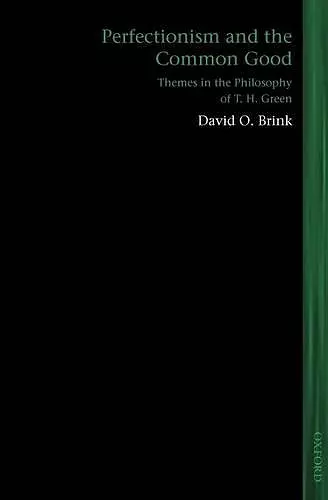Perfectionism and the Common Good
Themes in the Philosophy of T. H. Green
Format:Paperback
Publisher:Oxford University Press
Published:31st May '07
Currently unavailable, and unfortunately no date known when it will be back

David Brink presents a study of T. H. Green's classic Prolegomena to Ethics (1883) and its role in his philosophical thought. Green is one of the two most important figures in the British idealist tradition, and his political writings and activities had a profound influence on the development of Liberal politics in Britain. The Prolegomena is his major philosophical work. It begins with his idealist attack on empiricist metaphysics and epistemology and develops a perfectionist ethical theory that aims to bring together the best elements in the ancient and modern traditions, and that provides the moral foundations for Green's own distinctive brand of liberalism. Brink aims to restore the Prolegomena to its rightful place in the history of philosophy by providing a prolegomenon to the Prolegomena - one that situates the work in its intellectual context, sympathetically but critically engages its main themes, and explains Green's enduring significance for the history of ethics and contemporary ethical theory. Brink examines Green's life and work, his idealist attack on empiricism, his conception of agency, his perfectionist ethics of self-realization, the connections he draws between perfectionism and the common good, his conception of the differences between perfectionism and utilitarianism, and the connections between his perfectionism and his defense of a new form of political liberalism. Because Green develops his own views out of an examination of other traditions in the history of ethics, a fair assessment of Green's own contributions must compare his claims with the traditions that he examines and sometimes criticizes. Brink's study examines Green's relation to Aristotle, Locke, Hume, Butler, Mill, Kant, Hegel, Bradley, and Sidgwick, and concludes by examining Green's legacy for ethical theory. Perfectionism and the Common Good will be of substantial interest to students and scholars of the history of ethics, ethical theory, political philosophy, and nineteenth century philosophy.
Brink is successful in his effort to convince his readers that Green is a very reflective interpreter of both Aristotle and Kant, an interpreter who articulates Aristotle's and Kant's considered views better than these two thinkers themselves did. ...this is a short, crisp, readable book that makes one want to read Brink's new edition of Green's Prolegomena, both for the purpose of getting a fuller picture of the history of ethical theory as well as for the purpose of developing the best possible contemporary ethical theory. * The Review of Metaphysics *
ISBN: 9780199228058
Dimensions: 201mm x 135mm x 10mm
Weight: 195g
154 pages